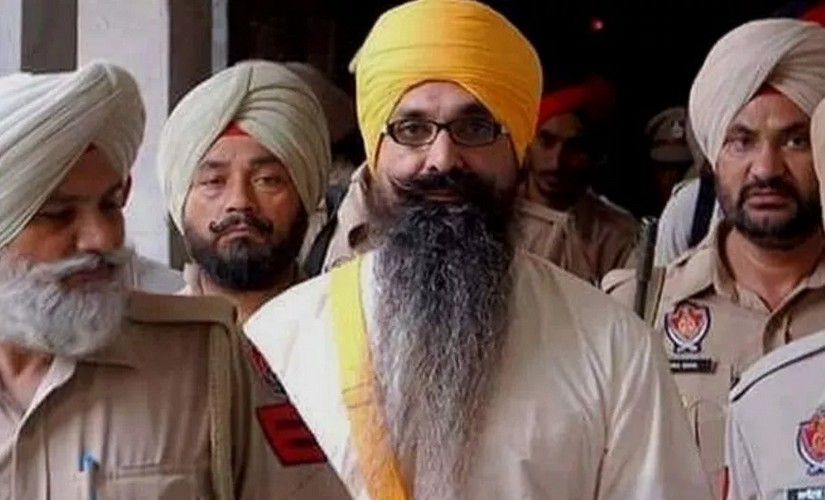Rajoana is one of those convicted for the assassination of Punjab CM Beant Singh in 1995, but Sikh groups have long demanded that his life be spared

Image Courtesy: News18
Last week Prime Minister Narendra Modi’s government at the Centre commuted Balwant Singh Rajoana’s death sentence to life. In doing so, it has met the long-standing demand of the Shiromani Gurudwara Prabandhak Committee (SGPC), BJP’s ally Shiromani Akali Dal (SAD) and other radical Sikh groups in Punjab.
Balwant Singh Rajoana has carried a death-wish for long. Lodged in jail since 1995 for the assassination of former Punjab Chief Minister Beant Singh, has neither hired an advocate to fight his case, nor moved a mercy petition seeking clemency.
A terrorist of some disrepute, Rajoana was the back-up suicide bomber in the plot to assassinate Beant Singh, the former Congress chief minister of Punjab. The attempt also killed 16 others, including three Commandoes, outside the Civil Secretariat in Chandigarh in 1995.
The move is being hailed as a gracious gesture by the Government ahead of the 500th birth anniversary of Guru Nanak, the founder of Sikhism. This decision comes close on the heels of erasing a ‘blacklist’ of Sikh foreign nationals who were involved in anti-India activities.
A Token of Goodwill?
On September 30, at the recommendation of the MHA, President Ram Nath Kovind exercised his powers under Article 21 of the Constitution to commute Rajoana’s death sentence to a life imprisonment.
Taking potshots at the Opposition, the SAD leader Maheshinder Singh Grewal said, “It was unfortunate that instead of showing tolerance and compassion towards Rajoana and the sentiments of the Akal Takth and the Sikh Sangat, an attempt was being made by certain Congress leaders to recreate tension and fissures in civil society.”
Rajoana’s hanging which was scheduled on March 31, 2012 was stayed on March 28, 2012 after the SGPC’s appeal. Why the commutation of the death sentence of a militant whose was responsible for an act of terror when just a month before on February 9, Afzal Guru was hanged, ignoring scores of appeals for clemency? Why did the Centre not listen to Yakub Memon’s appeals for mercy? Isn’t this a case of retribution when the Centre claims to be reformative in its approach?
In 2014, the Centre urged the Supreme Court to reject the plea by three Rajiv Gandhi assassins seeking commutation of their death sentence to life. The reasons cited? They suffered no agony or dehumanization during the 11 years their mercy petition was pending with the President.
Priyanka Gandhi had met Nalini Sriharan, one of the accused assassins, her way of coming to peace with the violence and loss that she had experienced. She remembered her mother Sonia Gandhi’s intervention in getting Nalini’s death sentence commuted to life imprisonment saying that though politically the matter was very different, personally they didn’t believe in hatred or violence towards any of the accused who had been incarcerated for over 27 years.
Helping Out Friends?
For every time the Centre has reiterated their ‘uncompromising stance’ on terrorism, the move to erase the blacklist of Sikh foreign nationals and commuting Rajoana’s death sentence confirms that such acts of kindness only stay within the party and community.
A meeting to mark the day of Afzal Guru’s hanging at the JNU got protestors earning the tag of ‘anti-nationals’, but nobody from the Centre lifted a finger when Rajoana was bestowed with the title of ‘Zinda Shaheed”.
While BJP’s ally SAD claims that Rajoana’s death sentence commutation is justified for he had already been incarcerated for 21 years, the Centre vehemently opposed the release of Rajiv Gandhi’s assassins.
Hindu majoritarians who conducted pogroms against the Sikhs in 1984 over Indira Gandhi’s assassination, seem to now have grown softer towards the community. They want people to ‘understand the circumstances’ which ‘forced’ people like Rajoana to commit terrorist acts.
Ideology of Compassion or Political Move?
The timing of granting mercy to Rajoana has not gone unnoticed. The Delhi assembly elections are around the corner and Sikh votes play the deciding role in many constituencies.
While campaigning for Rajoana’s release during the elections, the Centre has blatantly ignored the loss of 16 other lives lost along with Beant Singh’s. This being the same Centre that opposes the release of Rajiv Gandhi’s assassins citing that 14 other people died in the assassination.
Keeping in mind all these incidents, one can beg the question – how do the same rules apply differently under similar circumstances? Is this move by the Centre just an appeasement game or is it one towards honestly abolishing the gruesome death penalty?
Related
Death Penalty undermines Human Dignity: Teesta Setalvad